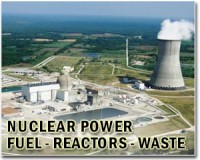 |
New Delhi (AFP) April 4, 2011 Japan's nuclear crisis has fuelled public unease in India over ambitious government plans to ramp up nuclear power capacity to feed the country's growing, energy-hungry economy. India -- both a civilian and a military nuclear power -- currently has 20 reactors. It plans to spend an estimated $175 billion to buy an additional 21 foreign reactors to reach a nuclear power capacity of 63,000 megawatts by 2032, from the current level of 4,560 megawatts. The enthusiasm for nuclear power was galvanised by a 2008 deal ending a decades-old ban on US atomic civilian trade with India, but recent events are sowing doubts about the potential consequences should anything go wrong. Writing in the DNA newspaper recently, the former head of the Atomic Energy Regulatory Board (AERB), A. Gopalakrishnan, said India contrasted poorly with Japan's "superb" disaster management organisation. "In India, we are most disorganised and unprepared for the handling of emergencies of any kind," he warned. "The AERB's disaster preparedness oversight is mostly on paper and the drills they once in a while conduct are half-hearted efforts which amount more to a sham," he added. And last week a top Indian scientist and other leading figures wrote an open letter describing the crisis in Japan as a "wake-up call" for India and urging the government to "radically review" its nuclear policy. "Pending the review, there should be a moratorium on all further nuclear activity, and revocation of recent clearances for nuclear projects," said P. Balaram, head of the Indian Institute of Science. Meanwhile, a survey of nearly 10,000 people by pollsters Chanakya, part of New Delhi's RNB Research, showed 77 percent of Indians were worried about atomic safety. And 69 percent did not believe India could handle a nuclear disaster on the scale of that in Japan, which saw reactor cooling systems knocked out by the March 11 tsunami, sparking partial meltdowns and chemical explosions. Premier Manmohan Singh has pledged India will make the Atomic Energy Regulatory Board more independent and increase transparency in operating nuclear plants. And India's current atomic energy regulator Srikumar Banerjee recently said driving or walking on New Delhi's notoriously lethal streets posed more of a threat than the country's reactors. However, experts say the government has not properly addressed a crisis scenario, given India's ramshackle infrastructure and largely untested emergency procedures. The Department of Atomic Energy has "cavalierly minimised" the potential of an accident, said Balaram's letter, which was also signed by Gopalakrishnan and former power secretary E.A.S. Sharma. The Japanese crisis has focused domestic attention on India's plans to construct what would be one of the world's largest nuclear plants at Jaitapur in a seismically sensitive region of Maharashtra state. French company Areva has signed a $9.3 billion deal to supply the first two of Jaitapur's six planned third-generation pressurised water reactors. But the region has experienced 92 earthquakes since 1985, including one measuring 6.2, according to environmental group Greenpeace. "The dangers have been swept under the carpet," Greenpeace spokesman Hofeza Merchant said. "With our corrupt and poor quality practices inherent in the system, it is very dangerous to meddle with such high-risk projects," said B. Ramakrishnam Raju, convenor of the National Alliance of People's Movements. Nonetheless so far, India has shown no signs of veering away from its nuclear plans, which it says it needs to help supply electricity to the 500 million Indians who are still not connected to the grid. India's fast-growing economy has no choice but to tap all sources of energy, Prime Minister Singh said last week. "Nuclear energy has the potential of playing an increasingly important role in giving our country energy independence"," he added.
Share This Article With Planet Earth
Related Links Nuclear Power News - Nuclear Science, Nuclear Technology Powering The World in the 21st Century at Energy-Daily.com
 Australia will stay with uranium exports
Australia will stay with uranium exportsCanberra, Australia (UPI) Mar 31, 2011 Australia says it intends to remain a major exporter of uranium for nuclear power plants despite the nuclear emergency at Japan's Fukushima reactors. Australia is one of the world's largest suppliers of uranium to fuel electricity-generating nuclear power stations around the world, Inter Press Service reported Wednesday. The International Atomic Energy Agency says there are 442 n ... read more |
|
| The content herein, unless otherwise known to be public domain, are Copyright 1995-2010 - SpaceDaily. AFP and UPI Wire Stories are copyright Agence France-Presse and United Press International. ESA Portal Reports are copyright European Space Agency. All NASA sourced material is public domain. Additional copyrights may apply in whole or part to other bona fide parties. Advertising does not imply endorsement,agreement or approval of any opinions, statements or information provided by SpaceDaily on any Web page published or hosted by SpaceDaily. Privacy Statement |